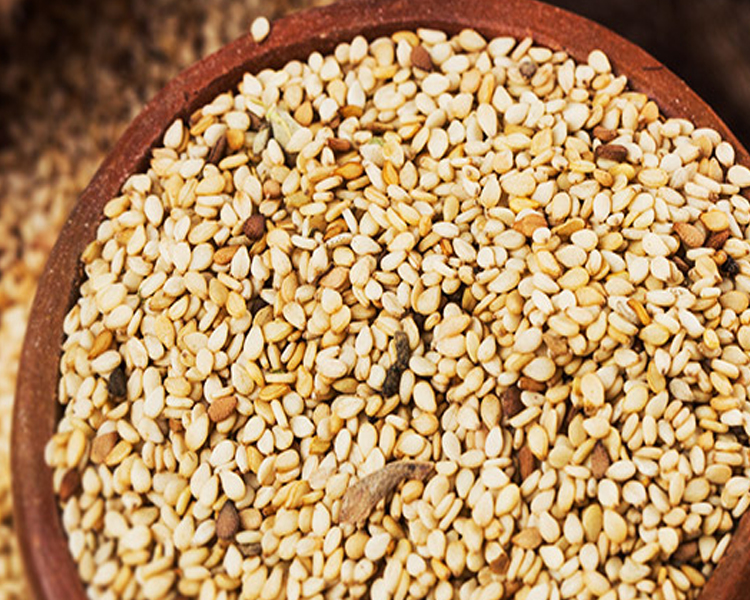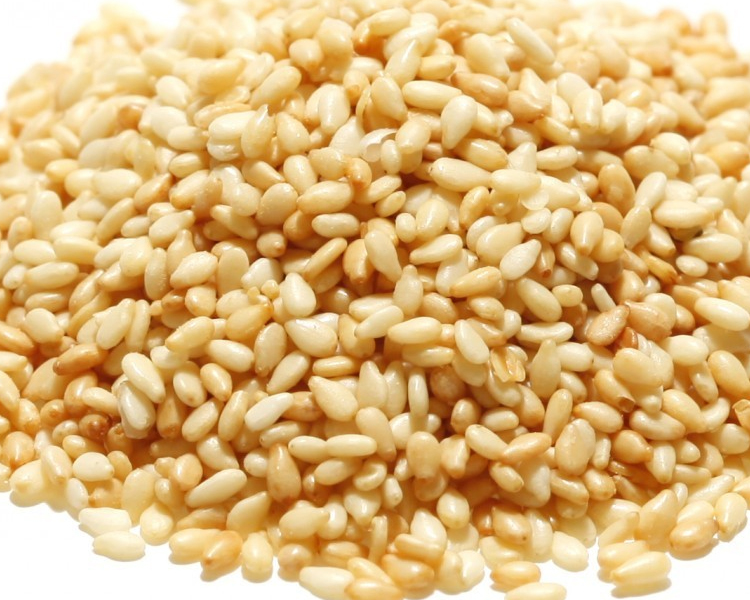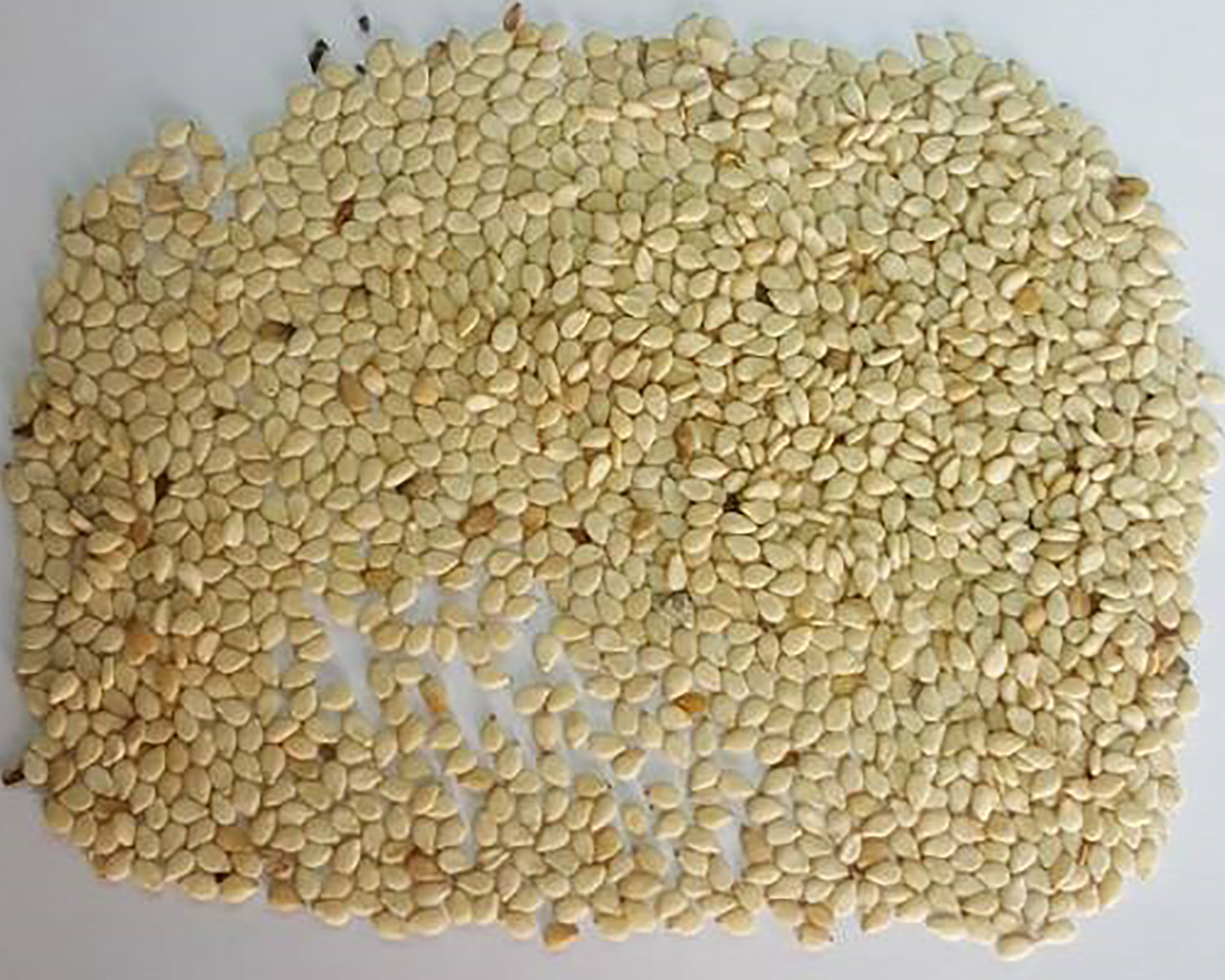Sesame seeds
Sesame, also known as "Sesam" or "Jaljlan" in Arabic, is a vital herbaceous plant. It is an essential oilseed crop with significant contributions to human nutrition through its seeds and oil. Sesame is widely used in various food industries, particularly in the production of sweets. Moreover, sesame cake finds application as animal feed.
English Name: Sesame.
Scientific Name: Sesamum indicum.
Sudanese sesame seeds are recognized for their high quality and abundant production. Sudan, being a major producer, benefits from favorable agricultural conditions, resulting in superior sesame crops. The seeds are available in varieties such as white and red, each with distinct characteristics. Sudanese sesame seeds are highly sought after globally for their rich flavor and oil content. They are widely used in various cuisines, adding a nutty flavor and crunch to dishes. These seeds are also nutritionally beneficial, being a good source of healthy fats, protein, fiber, and essential nutrients. Sudanese sesame seeds have substantial export potential, contributing to the country's economy and providing employment opportunities for farmers.
The importance of sesame:
Sesame is a valuable crop with rich oil content (48%-60%). Sesame oil is known for its taste, stability, and long shelf life due to antioxidants like sesamol, sesamolin, and sesamin. It is used in tahini, halva, baking, confectionery, soap making, antioxidants, cosmetics, and pharmaceutical products. Sesame cake, the residue after oil extraction, is a protein-rich animal feed. Sesame seeds also contain high levels of oil and protein, with varying fiber and carbohydrate content. Sesame has been used for food, oil, and medicinal purposes. Sesame oil is still popular in cooking and traditional dishes, and it is used in sweets and pastries, yielding tahini after pressing.
Sesame Specifications:
- White Sesame:
Oil Content Min. 48%, Moisture max : 8%, Admixture Max.1%, Purity Min. 99%, FFA Max. 2%, Other color seeds Max. 2%, Foreign matter Max. 2%.
- Brown (Red) Sesame:
Oil Content Min. 52%, Admixture Max.2%, Purity Min. 99%, Foreign matter Max. 3%, FFA Max. 3%, Other color seeds Max. 3%.
- Mixed Sesame:
Oil Content Min. 50%, Admixture Max.3%, Moisture max : 6 %.
- Black Sesame:
Oil Content Min. 48%, Moisture max : 8%, Admixture Max.1%, Purity Min. 99%, FFA Max. 2%, Other color seeds Max. 2%, Foreign matter Max. 2%.
More information.
Sesame oil is extracted through cold pressing or pressing methods, without the need for additional processing. The color of the resulting oil depends on the color of the pressed sesame seeds and the degree of roasting. The oil contains a high proportion of fatty acids and flavonoid compounds with antioxidant properties, which help preserve its natural characteristics without oxidation. This makes sesame oil of superior quality compared to other oils. Additionally, sesame oil has been found to contain a unique and high-quality protein composition, making it almost a complete food. It also contains calcium, potassium, phosphates, iron, and is cholesterol-free.
Every 100 grams of roasted sesame contains the following:
- Calories: 565.
- Fat: 48 grams.
- Saturated Fat: 6.72 grams.
- Carbohydrates: 25.74 grams.
- Fiber: 14 grams.
- Protein: 16.96 grams.
- Cholesterol: 0 grams.
The residual sesame , left after extracting oil from sesame seeds, is an excellent animal feed due to its high protein content. It is often mixed with soybean cake. The protein content in sesame cake can reach up to approximately 45% of raw protein, with fat content up to 10%. This may vary depending on the variety and oil extraction method. The remaining straw after harvesting the sesame crop can be used for heating purposes. Sesame seeds have high levels of oil and protein. The chemical composition varies based on the type, origin, color, and size of the seeds. The oil content is approximately 50%, while the ash content is around 5%. However, the fiber and carbohydrate content can vary significantly among different varieties, with raw fiber content ranging from 2.8% to 19.6% in black sesame varieties, while other varieties contain around 2.8%. The carbohydrate content ranges from 3% to 14%. Sesame is an oilseed crop that has been used as food and oil since ancient times. The oil derived from it contains a high percentage of proteins, fatty acids, and flavonoid compounds with antioxidant properties, which help preserve its natural characteristics. Sesame oil is still widely used in cooking, added to popular dishes, and many communities continue to rely on it for medicinal and therapeutic purposes. It is also used in the production of sweets and pastries. Additionally, a white or brown substance known as tahini is extracted from sesame after pressing.



